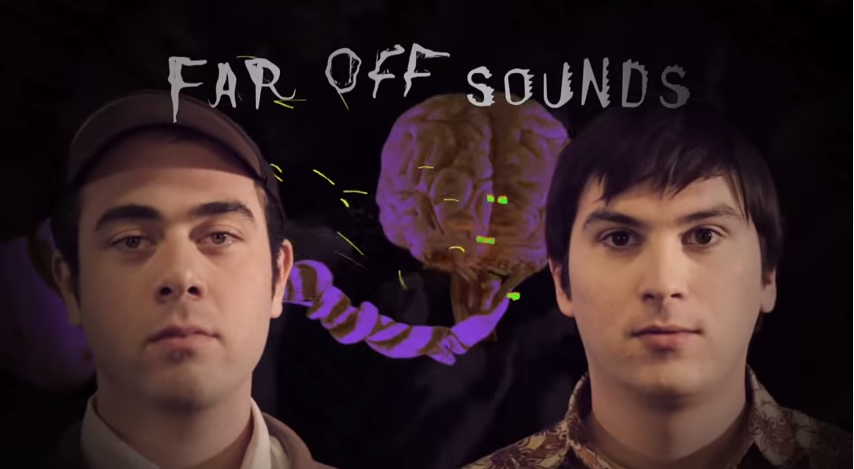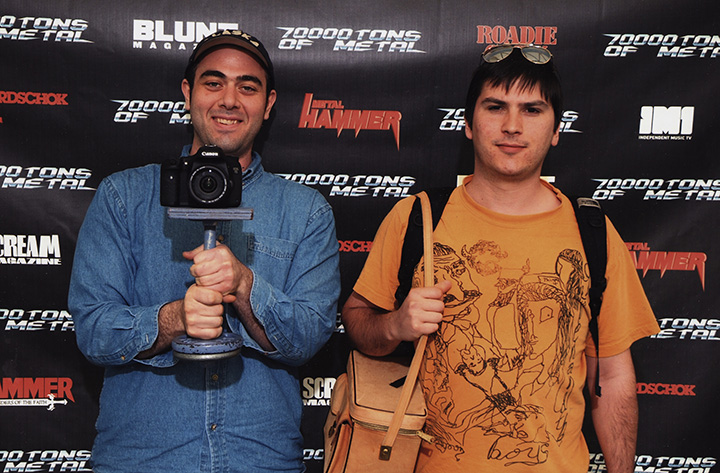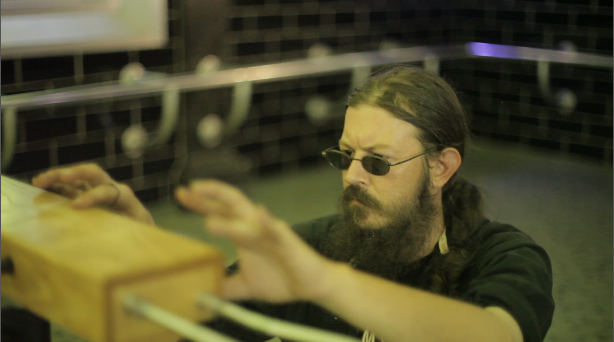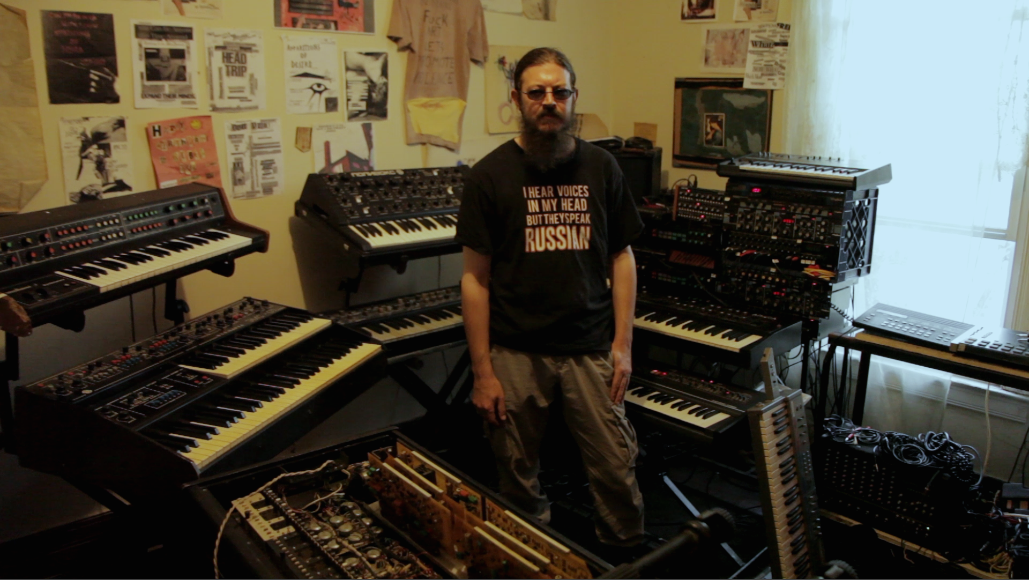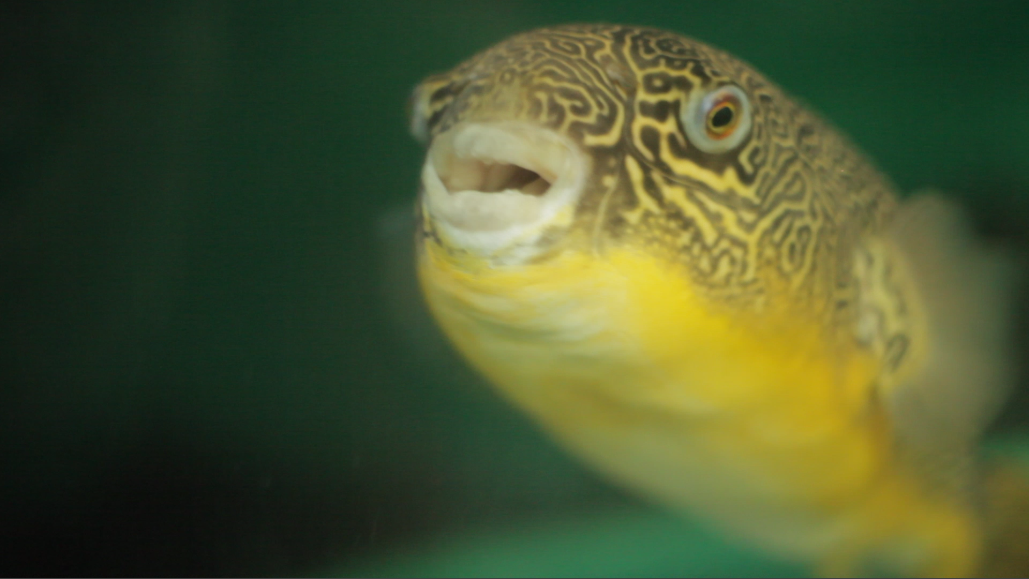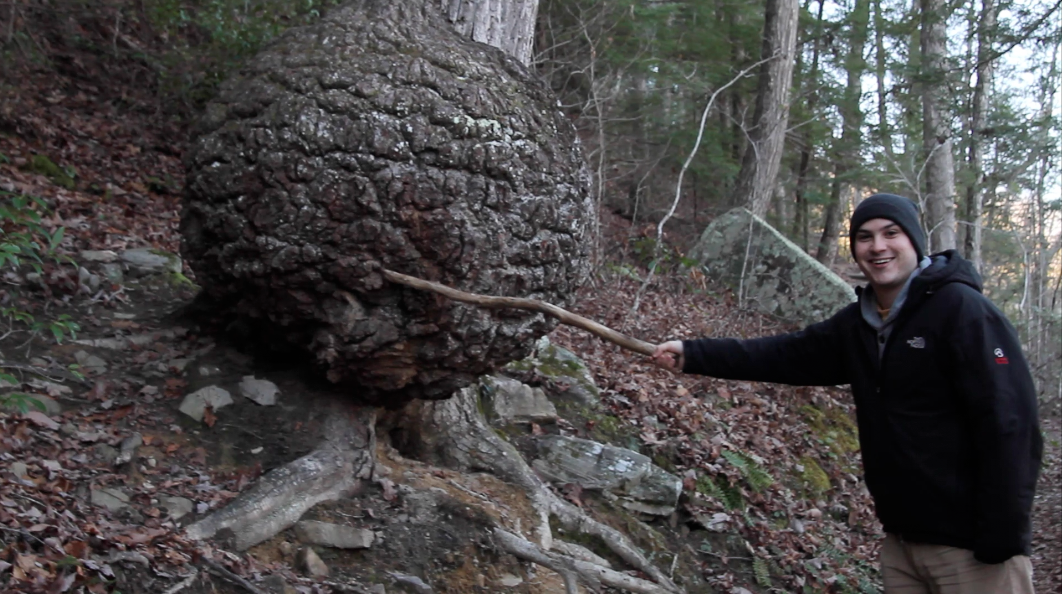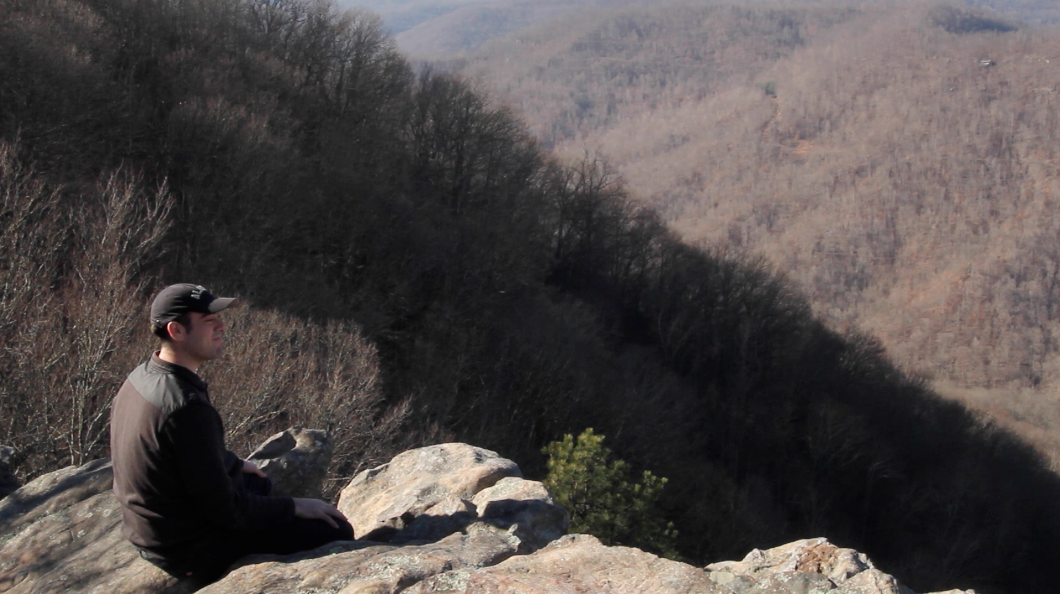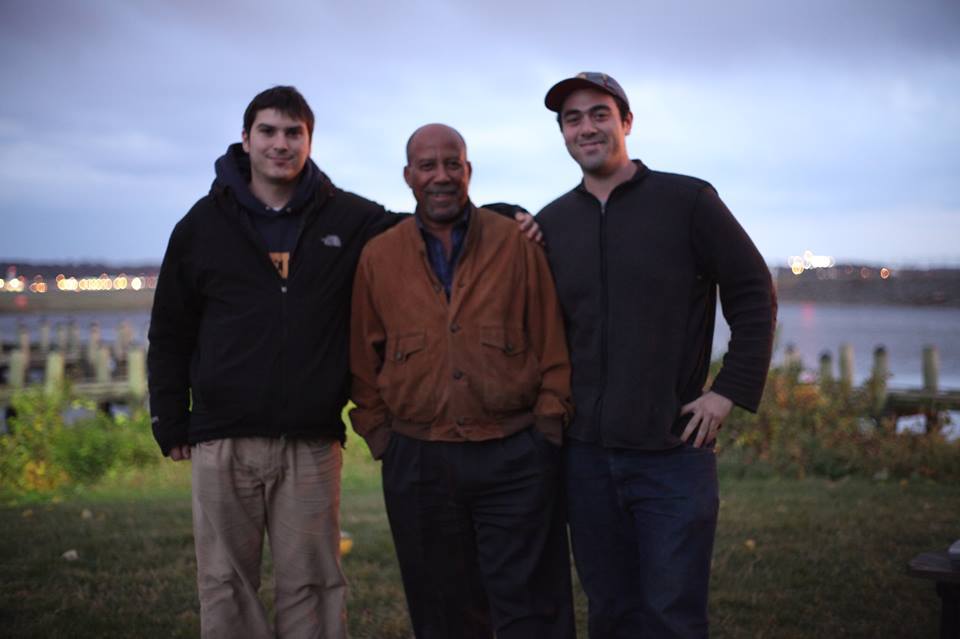“Music is the universal language of mankind.” This line out of Henry Wadsworth Longfellow’s Outre-Mer from 1835 seems as old as time itself but has been misquoted often enough that its sentiment rings hollow. The Internet, held in high esteem by many for its democratizing aims, has too often had a flattening effect on music. More of it is available and being made than ever before, but the discourse surrounding its production is full of terms implying loss, whether benign (streaming, compression) or bellicose (leaks, piracy). We might be saying a lot, but have we missed the point?
As Far Off Sounds, Nick George and Jacob Hurwitz-Goodman tell stories for our age of readily available, easy access to everything. But as the title of their project suggests, the subjects George and Hurwitz-Goodman choose to explore aren’t trending topics on social media. Nonetheless, from the funeral rites for a village chief in Ghana to the crushing riffs aboard a heavy metal cruise ship, the intimate tales the filmmakers depict in this web series are definitely social.
Roughly equal parts ethnomusicological survey, performance footage, and travel documentary, Far Off Sounds casts a wide net but zooms in close. Over eight episodes, the series has traveled to three continents and taken in genres as varied as outré noise, Indonesian Keroncong, and apocalyptic folk. At first blush, George’s and Hurwitz-Goodman’s methodology might appear to be haphazard, but if there’s a thread to tie together such disparate artists, it’s that they have a connection to their music that transcends this world. You could call it spiritual, or you could say it’s universal.
The filmmakers are no strangers to Detroit’s music scene, either. Hurwitz-Goodman, who can append Emmy Award winner to his title, recently shot the video for Gosh Pith’s “Waves.” His other works include the feature length Detroit Threat Management and the short film Incinerator, which aired on PBS in 2011. George is the founder and manager of Dr. Sushi, a Japanese food catering/events company, and is a co-organizer of Noise Brunch and Scrummage Fest.
With the release of the first episode of Far Off Sounds set in the Motor City, Detroit Music Magazine had a chat with Nick George and Jacob Hurwitz-Goodman to discuss their web series and some of the stories behind the stories. One thing was clear: if anyone could restore the promise of Longfellow’s bromide, it would be these fellows from Detroit.
What was the genesis of Far Off Sounds? Where did you come up with idea, and how did you get the project off the ground?
Jacob Hurwitz-Goodman: We have a friend who works for a major online media company. She’s a producer there, and she had an idea to make a show about music festivals around the world. She put the word out that she was looking for someone, and me and Nick were both like, “I wanna do it!” at the same time. Then she basically said, “You guys should both do it.” Unbeknownst to her, we were also roommates at the time. Anyway, neither of us really wanted to just go to music festivals all the time, so we suggested broadening the scope to be about musical subcultures or “unique musical experiences.” We went through a few months of pitching, then we got approved, and they gave us money to go on a month-long road trip and shoot three episodes. That’s when we made the snake handlers episode, the Tampa noise scene episode, and the heavy metal cruise ship one. It was an amazing experience. Ultimately, they decided not to pick up the show, because I think they found it a little too slow-paced for a web series. But we loved doing it, so we’ve found ways to continue fundraising and releasing them ourselves in between other projects. That brings us to now, in a summarized kind of way. The show has changed a lot since those initial three, I think.
Nick George: I think the thing that’s changed most is that we have entire creative control now, in the sense that we’re not looking for a seal of approval before the release. We don’t have to bounce the rough cuts off anyone but ourselves. If we want to make a 23-minute episode about Dave Bixby, we can do that.
JHG: Right, and I think we’ve also learned how to work with each other over time — just naturally. Whether we had stayed with the company or not, the show would have gotten better over time.
NG: Yeah, we’ve also fallen into our roles a bit. We still share a lot of the duties, but Jacob is more tech- and editing-focused, and I’m on more of the organizational duties.
JHG: I wouldn’t define my role as “tech,” but maybe I just want to idealize the job of a cameraman.
NG: It’s interesting, though. We’re a two-man crew. We’re learning tons about production and gaining a lot of hands-on experience across the board: everything from conception and research to making subscribe cards and press releases — everything between pre and post.
A lot of your subjects could be classified, for lack of a better word, as “outsider” artists or scenes. That’s implicit in the title of your series itself. How do you choose your subjects, and where do you find them?
JHG: I’ll let Nick start the ball rolling here. He has most often been the guy who sniffs out interesting stuff for us to explore.
NG: I’ve been making music, touring, and booking shows for 12 years or so. I was able to meet a lot of musicians along the way. For the snake handlers episode, I asked my old friend Daniel Bachman, whom I played with in DC with back in 2007 after coming across his MySpace page. We talked a lot about Appalachian music that night, and we kept in touch. I asked him if he knew of any interesting gospel music we should check out on the way to Florida, and he told me the music played at these snake handling churches was unlike anything else. He sent me some YouTube videos of services, and the music was more engaging to me than the snake handling itself. I was HOOKED — had to check it.
JHG: Right, I think also I was going through an intense folk phase, and when we were talking about that trip, it was something like, “I want some Appalachian roots music.” And then we ended up in a corner of the world that is more like that than anything else right now.
NG: We’re about to shoot a number of episode in California, so I’ve been hitting up everyone I know on the West Coast, seeing if they have any ideas. So far it’s been fruitful, and it’s great when our talented friends can join in on the production on some capacity.
How about the international episodes? I imagine it must be more difficult to traverse the language barrier and procure the cooperation of foreign artists. What are some of the challenges you’ve faced globally?
NG: Well, the episode from Indonesia was filmed before the conception of Far Off Sounds. I shot some anthropological video for a project I worked on through Wayne State. I taught myself some Indonesian so I could ask questions about music.
JHG: Yeah, and there was one episode about a chief’s funeral in Ghana that I shot back in 2011 when I lived there as a videographer. The official language of Ghana is English, so there was one person who was a friend of mine in that village who spoke English, and he invited me to see the funeral. But we’ve never actually shot anything internationally as Far Off Sounds. We both just had this amazing footage lying around and decided to release it under this project.
NG: Right, it made sense, and we’ll be releasing more international stuff this year. I’ve got a lot more footage from Indonesia.
How did you find Hailu Mergia?
NG: I organized a show for Brian Shimkovitz, who runs the Awesome Tapes from Africa label. He stayed at my place afterwards, and I showed him Far Off Sounds. I told him if he ever had a good story for us to get in touch…. Listening to [Hailu] play piano for us in his living room is one of my favorite Far Off Sounds moments.
JHG: For me, because of the language barrier, interviewing Hailu was a real challenge. And so I interviewed him for probably over two hours over that whole trip. During editing, I realized it was those moments in between the moments — the unsaid things — where he revealed himself to us and opened up. It’s why that one is one of my favorites. I mean, he’s really eloquent and open and warm, but getting personal is never so easy with someone who is used to expressing themselves in another language. But I think and hope that our dynamic and his warmth came across as much non-verbally as verbally, which is one of the main goals of the series, I think.
The Dave Bixby episode is by far your longest. It also has a Michigan connection. Can you walk us through the gestation and production of that episode, describe what Bixby was like in person, tell us any favorite memories you had making it, and whether you think you’ll make an episode of that length again?
JHG: Nick found Bixby. As usual, Nick’s longstanding musical passion led us down that road.
NG: I first heard his album back in 2007, I think. It was making the rounds online. Then a friend of mine sent me a Craigslist post back in the summer of 2011? The post was like, “Dave Bixby is looking for a show in Detroit,” and the date was like, three days away. So i started making a ton of calls — called every venue in town. I found out the Lager House was open and just booked the show before even contacting Bixby. I let the Lager House know what the deal was. I got in touch with Bixby, and he agreed to come do the show. He played mostly a set of covers and “Drug Song.”
JHG: Meaning he played only one original song, for those who don’t know his oeuvre.
NG: Right. I ended up talking to Bixby for a long time, like two years. I’m a good listener, and Dave’s a good talker. He can riff endlessly, and it’s great. We started toying around with the idea of making a documentary about Dave, his past, the group, and his album. We organized a benefit show and silent auction to bring him to Michigan for a mini-tour, and the episode was shot over four days around Michigan. We worked with tons of people to make that episode happen.
JHG: It was a big one. His first tour in 2011 was a little strange because everyone wanted to hear Dave Bixby songs, and he barely played any, which was part of the impetus for bringing him back out. The tour that we shot was largely a process of him coming to terms with this music that was so troubling for him, music he thought he would never play again.
NG: It was interesting to hear Dave in the year leading up to the tour, over the phone, explaining to me the difficulties in learning the material again, digging up all those memories. There’s still some songs Dave can’t play because it’s too painful for him.
JHG: I also want to just say that the length of the Bixby episode was a struggle. Because we’re making content for online, the impulse is to keep it shorter. But his story is so sprawling and takes place over several decades, so we needed more time to tell it. If I had my way and lots of time, we would edit all that footage into a feature film and shoot a bunch more interviews. It was a very strange weekend, to say the least.
Tell us a little bit about Richard Kik. How did you meet or discover him?
JHG: Nick is the one who introduced us to him.
NG: Mark from Spaceband, a local act I’ve been a fan of for years, has been a fan of our show since day one. He’s always burning me CDs and telling me about local gigs. One day we were chatting, maybe at Noise Brunch or something, about the show and potential episodes. He had just jammed with Richard. Mark told me about Richard’s synthesizer collection and how he was planning on jamming at the Belle Isle Aquarium. I knew I had to meet the guy and see what he was up to. This gave us a great opportunity to finally make an episode here in Detroit.
Does the aquarium house his equipment? Does it put on his shows?
NG: Nah, his stuff rarely leaves the studio. If I had that kind of gear, I wouldn’t move it around either.
JHG: [Kik] was saying when we filmed that he used the aquarium space once for a fundraiser that included live music, and that was how Mark from Spaceband found out it had such amazing acoustics.
NG: Right, I think they’ve had one jam at the aquarium. That was kind of like a group thing, but they’re not a venue for concerts by any means. Maybe that’ll change one day.
Is there any organization such as Guinness that has verified Kik has the largest collection of Soviet synthesizers in the United States?
NG: That’s a pretty difficult thing to qualify, and Richard would never be the first person to claim it officially, but he’s believed to have the largest collection in America, probably because the hobby is so esoteric. One thing that wasn’t mentioned in the video that blew my mind was that he learned to read Russian via synthesizer manuals.
Wow, that is pretty insane. Can he speak it as well?
JHG: He never spoke Russian to us, but his T-shirt said “I hear voices in my head and they speak RUSSIAN.” He also made it clear that he could read and understand Russian.
In the video, Kik speaks about fish and the way they communicate, as well as the connection between fish and his synthesizers. What drew him to these two passions?
JHG: He grew up in rural Michigan near a lake, and ever since he was a child, he interacted with the wildlife. He describes catching a Gar fish when he was very young and naming it and taking care of it. These are primordial, sharp-toothed, long-nosed, native Michigan fish. This was his first experience communing with the watery world.
NG: I think his synthesizer affinity is rather recent, within the past ten years or so.
JHG: Yeah, he tells a little story that’s in the video about how the first time he ever made music it was basically remixing short-wave radio broadcasts from Russia, but that was probably before he was using synths.
Has Kik ever been to Mother Russia?
JHG: I believe we asked him, and he said no, or am I imagining that, Nick?
NG: Haha, I don’t think he has, but he would love to visit.
JHG: Bam.
NG: I could be wrong.
Speaking of visiting, you both have traveled quite a bit for Far Off Sounds. What’s your favorite place you’ve been?
NG: Let’s see. My favorite place we’ve traveled together for Far Off Sounds would be southeast Kentucky, deep Appalachia. It’s one of the most beautiful places I’ve seen: nice folks, great music.
JHG: That was actually my answer, as well. Traveling together as Far Off Sounds and being able to spend time in Kentucky was amazing.
NG: Huge departure from the city.
JHG: It was our very first episode and a very rich experience.
What can we expect next from Far Off Sounds?
JHG: Nick’s coming to California, where I’m based now. We’re gonna spend a few weeks shooting as much as we possibly can here on the West Coast.
NG: We’ve got a few ideas lined up with a handful of others I’m working on.
Who or what are the subjects of the West Coast episodes?
JHG: There’s one about a woman called Space Lady, who was this incredible busker from the ’80s and ’90s. And we’re trying really hard to tap into the Cambodian music scene here in California, just to name a couple.
NG: We’re also going to explore microtonal music.
Harry Partch and the like?
NG: Correct.
Are there any artists or scenes in Detroit that you’d like to explore?
JHG: I’ve always been interested in the possible connection between the automotive industry and techno music to explore whether the pounding rhythm of the auto plant can in any way be justifiably connected to the beats of electronic music, in terms of an origin story.
NG: Also, the jit dance crews that go nuts at ghettotech shows. I haven’t seen somebody jit in years. We try to focus on more contemporary subjects, but if we made historical docs, I’d like to do a piece about that mansion on the East Side near the river, The Garwood. Tons of bands lived and played there — sounded like the best house shows of all time.
JHG: Also, Richard Kik is working on a setup to make music with electric eels — like, to connect their electric pulses with amplified instruments. That’s something I want to film, and hopefully it can be a follow-up to Fish & Synths.
NG: Frank Pahl would be cool to do an episode about. Also, Qasidah traditions in Dearborn.
JHG: There are also immigrant communities in Detroit that all have their own preserved musical traditions that would be amazing, like Polish, Iraqi, Mexican, and Lebanese communities, to name a few. A lot of Eastern Europeans live in Metro Detroit, and you know they’ve got some beautiful instruments tucked away. My girlfriend was at a Coney Island late one night—
NG: Noah from Duly’s?
JHG: Yes! That’s what I was about to say!
NG: Total ripper. He played the Trinosophes grand opening, I think? OH! Clem Fortuna would be a great episode — master piano tuner. Also, there’s a crew of rappers who are all in high school that my friend Alex Lauer makes beats for — really great stuff.
JHG: You heard it here, folks.
What has been your favorite part about working on Far Off Sounds?
JHG: My favorite part about working on Far Off Sounds has been the ability to learn about people and what matters to them and to have them express it in non-verbal ways to us.
NG: My favorite part is seeing a project through to its completion and feeling like we’ve done a great job of telling the story. Working together with the people and the music and just having this feeling that you are making something together. Seeing this big idea come to fruition. I love that it’s infinite and endlessly fascinating. We’ll never run out of things to cover.
To learn more about Far Off Sounds and watch all the episodes of the series, visit faroffsounds.org.
